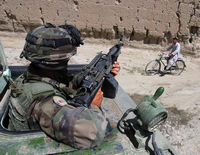
The armored truck came apart in a puff of smoke and debris. It was Aug. 20, election day in Wardak province, Afghanistan, southwest of Kabul. U.S.-led forces in Afghanistan had braced for increased levels of violence on this day. But the massive bomb — constructed of a plastic barrel with a nitrate fertilizer filler — that struck the American truck was more than anyone expected. Of the two U.S. Army soldiers riding in the front of the vehicle when the bomb struck, one was seriously injured. Specialist Justin Pellerin, 21, the driver, died instantly. Improvised Explosive Devices (IEDs) are taking […]
